#Oracle Financials Cloud training
Explore tagged Tumblr posts
Text
Oracle Fusion Financials Training | Fusion Financials Training |Oracle Financials Cloud training
Are you looking to enhance your skills in Oracle Fusion Financials? Look no further than Fusion Duniya, your go-to source for comprehensive Oracle Fusion Financials Training. Whether you're a beginner or an experienced professional, our tailored training programs cover everything from basic concepts to advanced topics, helping you master the intricacies of Oracle Financials Cloud. Our expert instructors bring real-world experience to the table, delivering hands-on training, practical examples, and industry best practices. With a focus on practical learning, our Fusion Financials Training equips you with the knowledge and skills to excel in your career. Join us at Fusion Duniya and unlock your full potential in Oracle Fusion Financials!
Visit us at https://www.fusionduniya.com/oracle-fusion-financials-online-training/
#Oracle Fusion Financials Online Training#oracle fusion financials training#Fusion Financials Training#Fusion Financials Online Training#Cloud Financials training#Oracle Financials Cloud training
1 note
·
View note
Text
#oracle hcm cloud training#oracle fusion hcm course#oracle fusion financials online training#oracle fusion scm training#oracle fusion technical training online
2 notes
·
View notes
Text
The Path to Becoming an Oracle Fusion Consultant: Skills and Challenges | Oracle scm cloud training

Learn about the skills and challenges that come with becoming an Oracle Fusion consultant, and discover the rewarding career path that awaits in the world of enterprise software
0 notes
Text
Oracle Cloud Financials Training Online
Oracle Cloud Financials training online is available through various channels. Here are some options for Oracle Cloud Financials online training:
Oracle University: Oracle University offers official training courses for Oracle Cloud Financials. These courses cover various modules and functionalities within Oracle Cloud Financials, including General Ledger, Accounts Payable, Accounts Receivable, Cash Management, and more. The training courses are delivered through instructor-led training, virtual classes, or self-paced online courses. Oracle University's training provides comprehensive coverage of Oracle Cloud Financials and includes hands-on exercises to enhance practical skills.
Online Training Providers: Several online training providers offer Oracle Cloud Financials courses that can be accessed remotely. Platforms such as Techleadsit, Coursera, LinkedIn Learning, and Simplilearn offer a variety of online courses on Oracle Cloud Financials. These courses provide flexibility in terms of scheduling and self-paced learning options. They often include video lectures, demonstrations, practice exercises, and quizzes to help you understand and apply Oracle Cloud Financials concepts.
Oracle Cloud Learning Subscriptions: Oracle Cloud Learning Subscriptions provide on-demand access to training materials, videos, and resources for various Oracle Cloud products, including Oracle Cloud Financials. These subscriptions offer a comprehensive library of self-paced learning modules and allow you to learn at your own pace and access the content anytime, anywhere.
When selecting an online training option, consider factors such as the reputation of the training provider, the course content, the delivery method (video lectures, demonstrations, hands-on exercises), and any certification options that may be available. It's important to choose training that aligns with the latest version of Oracle Cloud Financials.
Additionally, stay updated with Oracle's official website and documentation for the latest releases and updates of Oracle Cloud Financials. Engaging with Oracle communities, user groups, and forums can also provide valuable insights and networking opportunities.
Remember that gaining practical experience by applying the knowledge gained through training is essential for effectively using Oracle Cloud Financials in real-world scenarios. Continuous learning and staying updated with the latest industry trends and best practices are also important for success in Oracle Cloud Financials implementation and management.
What Is Oracle Fusion Cloud Financials?
Fusion Financials is an ERP product from Oracle used to manage all the financial transactions of the company which provides the ability to view the financial performance of the company from the Balance Sheet and Training Balance Reports.
Oracle Fusion Financials is the strongest ERP in the market compared to other competitors, it occupies the majority of the share in the market and many clients trust and use this application to capture their day-to-day finance operations. The clients are scattered from different industries like Retail, Health, Pharma, Oil & Gas, Telecommunications, Airlines, and Banking, etc.
Prerequisites To Learn Fusion Financials Cloud Training
Yes, you should be a graduate from a finance background like B.com, CA, ICWA should have accounting subject in your academics. Any fresher graduate can learn this course or someone who worked as an accountant in a firm and the people who have any ERP (finance) background can learn this course.
0 notes
Text
#oracle fusion financials online training#oracle fusion financials training#oracle fusion cloud financials online training
0 notes
Text
2024 team sponsors recap!
this is completely irrelevant to F1 but i study and do these stuffs for a living sooo 😩😩 2023 sponsors are based on the sponsors that are there at the beginning of the season (new sponsors that join in the middle of the season will be classified as 2024's)
Mercedes AMG Petronas F1 Team:
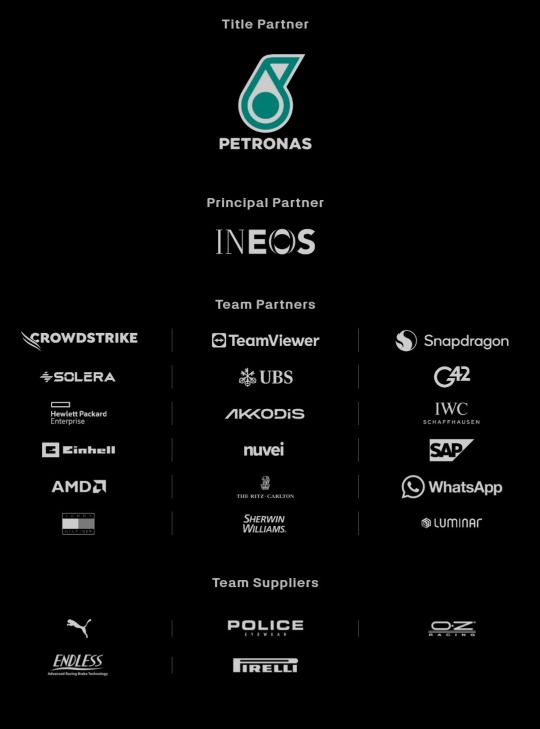
New sponsors: Whatsapp, Luminar (American tech company), SAP (German software company), nuvei (Canadian credit card services), Sherwin Williams (American painting company) 2024 data last update: 2024/02/14
Old sponsors that left: Monster Energy, Pure Storage (American technology company), fastly (American cloud computing services), Axalta (American painting company), Eight sleep (American mattresses company) 2023 data last update: 2023/01/07
Oracle Red Bull Racing F1 Team:

New sponsors: Yeti (American cooler manufacturer, joined later in 2023), APL (American footwear/athletic apparel manufacturer, joined later in 2023), CDW (American IT company, joined later in 2023), Sui (American tech app by Mysten Labs, joined later in 2023), Patron Tequila (Mexican alcoholic beverages company, joined later in 2023) 2024 data last update: 2024/02/15
Old sponsors that left: CashApp, Walmart, Therabody (American wellness technology company), Ocean Bottle (Norwegian reusable bottle manufacturer), PokerStars (Costa Rican gambling site), Alpha Tauri (? no info if they're official partners or not but Austrian clothing company made by Red Bull), BMC (Switzerland bicycle/cycling manufacturer), Esso (American fuel company, subsidiary of ExxonMobil), Hewlett Packard Enterprise (American technology company) 2023 data last update: 2023/03/07
More: Esso is a subsidiary of Mobil so there's possibility they merged or something
Scuderia Ferrari:

New sponsors: VGW Play (Australian tech game company, joined later in 2023), DXC Technology (American IT company, joined later in 2023), Peroni (Italian brewing company), Z Capital Group/ZCG (American private asset management/merchant bank company), Celsius (Swedish energy drink manufacturer) 2024 data last update: 2024/02/15
Old sponsors that left: Mission Winnow (American content lab by Phillip Morris International aka Marlboro), Estrella Garcia (Spanish alcoholic beverages manufacturer), Frecciarossa (Italian high speed train company) 2023 data last update: 2023/02/16
More: Mission Winnow is a part of Phillip Morris International. They are no longer listed as team sponsor but PMI is listed instead.
(starting here, 2023 data last update is 2023/02/23 and 2024 data last update is 2024/02/15)
McLaren F1 Team: (Only McLaren RACING's data is available idk if some of these are XE/FE team partners but anw..)
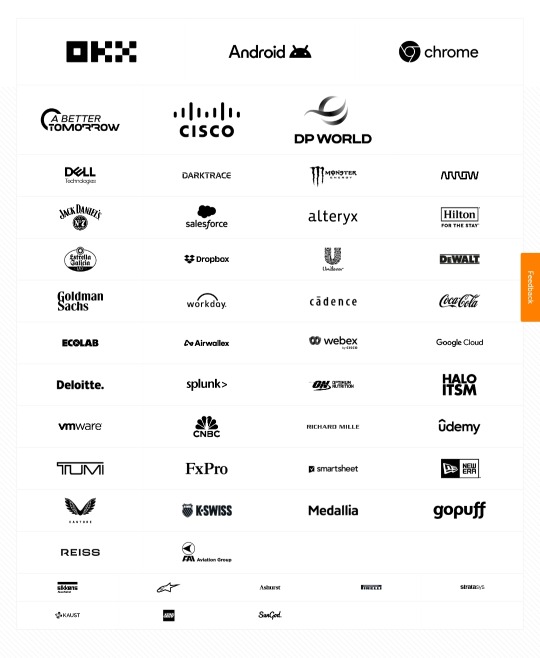
New sponsors: Monster Energy, Salesforce (American cloud based software company, joined later in 2023), Estrella Garcia (Spanish alcoholic beverages manufacturer), Dropbox (American file hosting company), Workday (American system software company, joined later in 2023), Ecolab (American water purification/hygiene company), Airwallex (Australian financial tech company), Optimum Nutrition (American nutritional supplement manufacturer), Halo ITSM (American software company, joined later in 2023), Udemy (American educational tech company, joined later in 2023), New Era (American cap manufacturer, joined in 2023), K-Swiss (American shoes manufacturer, joined later in 2023), Alpinestars (Italian motorsports safety equipment manufacturer)
Old sponsors that left: DP World (Emirati logistics company), EasyPost (American shipping API company), Immersive Labs (UK cybersecurity training company?), Logitech, Mind (UK mental health charity), PartyCasino (UK? online casino site), PartyPoker (American? gambling site), Sparco (Italian auto part & accessory manufacturer), Tezos (Switzerland crypto company)
Aston Martin Aramco F1 Team:

New sponsors: Valvoline (American retail automotives service company, joined later in 2023), NexGen (Canadian sustainable? fuel company), Banco Master (Brazilian digital banking platform, joined later in 2023), ServiceNow (American software company, joined later in 2023), Regent Seven Seas Cruise, Wolfgang Puck (Austrian-American chef and restaurant owner, joined later in 2023), Financial Times (British business newspaper), OMP (Italian racing safety equipment manufacturer), stichd (Netherlands fashion & apparel manufacturer)
Old sponsors that left: Alpinestars (Italian motorsports safety equipment manufacturer), crypto.com (Singaporean cryptocurrency company), ebb3 (UK? software company), Pelmark (UK fashion and apparel manufacturer), Peroni (Italian brewing company), Porto Seguro (Brazilian insurance company), Socios (Malta's blockchain-based platform), XP (Brazilian investment company)
Stake F1 Team (prev. Alfa Romeo):
???? Can't found their website (might be geoblocked in my country???)
BWT Alpine F1 Team:

New sponsors: MNTN (American software company), H. Moser & Cie (Switzerland watch manufacturer), Amazon Music
Old sponsors that left: Bell & Ross (French watch company), Ecowatt (??? afaik French less-energy smthn smthn company), Elysium (French? American? Software company), KX (UK software company), Plug (American electrical equipment manufacturing company)
Visa CashApp RB F1 Team (prev. Scuderia Alpha Tauri):

New Sponsors: Visa, CashApp, Hugo Boss, Tudor, Neft Vodka (Austrian alcoholic beverages company), Piquadro (Italian luxury bag manufacturer)
Old sponsors that left: Buzz (?), Carl Friedrik (UK travel goods manufacturer), Flex Box (Hongkong? shipping containers manufacturer), GMG (Emirati global wellbeing company), RapidAPI (American API company)
Haas F1 Team:

New sponsors: New Era (American cap manufacturer, joined later in 2023)
Old sponsors that left: Hantec Markets (Hongkong capital markets company), OpenSea (American NFT/Crypto company)
Williams Racing:


New sponsors: Komatsu, MyProtein (British bodybuilding supplement), Kraken (American crypto company, joined later in 2023), VAST Data (American tech company), Ingenuity Commerce (UK e-commerce platform), Puma (joined later in 2023)
Old sponsors that left: Acronis (Swiss software company), Bremont (British watch manufacturer), Dtex Systems (American? cybersecurity company), Financial Times (British business newspaper), Jumeirah Hotels & Resorts, KX (UK software company), OMP (Italian racing safety equipment manufacturer), PPG (American painting manufacturer), Umbro (English sports equipment manufacturer), Zeiss (German opticals/optometrics manufacturing company)
#mercedes amg petronas#red bull racing#scuderia ferrari#visa cash app rb#haas f1 team#mclaren f1#aston martin#alpine f1#williams racing#stake f1 team#f1#ari's rant#sponsor talks
42 notes
·
View notes
Text
The Evolution and Impact of ERP Software in the UAE: A Comprehensive Analysis
ERP stands for Enterprise Resource Planning. It is a type of software system that integrates and manages core business processes and functions within an organization. ERP software typically provides a centralized database and a suite of applications that automate and streamline business activities across various departments such as finance, human resources, supply chain management, manufacturing, sales, and customer service.
In the fast-paced landscape of business operations, efficient management of resources and information is critical for success. Enterprises in the United Arab Emirates (UAE) have witnessed a remarkable transformation in their operational efficiency and competitiveness through the adoption of Enterprise Resource Planning (ERP) software. This article delves into the evolution, benefits, challenges, and future trends of ERP software within the UAE context.
In recent decades, Enterprise Resource Planning (ERP) software has played a transformative role in how businesses in the United Arab Emirates (UAE) operate and manage their resources. This article delves into the evolution, adoption, and impact of ERP systems within the UAE's business landscape. By exploring the unique challenges and opportunities presented by the UAE's dynamic economy, we can better understand how ERP software has become an indispensable tool for organizations seeking efficiency, integration, and scalability.
Evolution of ERP Software
The adoption of ERP software in the UAE mirrors global trends but is uniquely shaped by regional business requirements and technological advancements. In the early 2000s, ERP systems gained traction among larger corporations seeking to streamline their complex processes. Major multinational ERP providers like SAP, Oracle, and Microsoft Dynamics established a strong presence in the region, catering to diverse industry needs including finance, manufacturing, retail, and logistics.
A notable development in recent times is the movement towards cloud-centric ERP solutions.This transition offers scalability, flexibility, and cost-effectiveness, allowing businesses in the UAE to manage their operations more efficiently. Local ERP vendors have also emerged, offering tailored solutions that cater specifically to the nuances of the UAE market, such as compliance with local regulations and cultural practices.
Challenges and Obstacles
Despite the numerous benefits, ERP implementation in the UAE is not devoid of challenges. One prominent obstacle is the high initial investment required for ERP deployment, including software licensing, customization, and training costs. For smaller businesses, this financial commitment can be prohibitive, leading to slower adoption rates among SMEs.
Cultural factors and change management also pose challenges. Embracing new technology often requires a shift in organizational culture and employee mindsets. Resistance to change, coupled with the need for extensive training, can hinder the successful implementation of ERP systems in the UAE.
Furthermore, data security and privacy concerns are paramount, especially in light of stringent regulatory frameworks such as the UAE's Data Protection Law. Ensuring compliance with local data protection regulations adds complexity to ERP deployment, necessitating robust cybersecurity measures and data governance protocols.
The Business Landscape of the UAE
The UAE is renowned for its vibrant economy, diversified industries, and strategic geographical location. Over the years, the country has emerged as a global business hub attracting multinational corporations, SMEs, and startups alike. Key sectors such as finance, real estate, construction, logistics, tourism, and manufacturing contribute significantly to the nation's GDP. However, this diversification has also brought complexities in managing business operations efficiently.
The Emergence of ERP Solutions
As businesses in the UAE expanded and diversified, traditional methods of managing operations became inadequate. The need for integrated systems that could streamline processes across departments led to the rise of ERP solutions. Initially developed to manage manufacturing processes, ERP systems evolved to encompass finance, human resources, supply chain, customer relationship management, and more. This evolution mirrored the growth and diversification of UAE businesses.
Factors Driving ERP Adoption
Several factors have fueled the adoption of ERP software among businesses in the UAE:
Global Competition: The UAE's aspiration to compete on a global scale necessitated advanced operational efficiencies that ERP systems could deliver.
Regulatory Compliance: The UAE's regulatory environment, including VAT implementation, required robust financial and reporting capabilities that ERP systems could provide.
Scalability: With rapid economic growth, businesses needed scalable solutions to manage increasing complexities.
Integration Needs: As businesses diversified, the need for seamless integration across functions became crucial.
Challenges in ERP Implementation
While the benefits of ERP systems are substantial, implementing them poses challenges:
Cultural Factors: Embracing technological change and adopting new systems can face resistance due to cultural factors.
Resource Constraints: SMEs may struggle with the limited resources required for ERP implementation and customization.
Data Security and Privacy: The UAE's focus on data security and privacy necessitates robust ERP solutions compliant with local regulations.
Impact of ERP on UAE Businesses
The impact of ERP software on businesses in the UAE has been profound:
Improved Efficiency: Streamlined processes lead to increased productivity and reduced operational costs.
Enhanced Decision Making: Real-time data availability empowers businesses to make informed decisions.
Better Customer Experience: Integrated systems ensure seamless customer interactions and improved service delivery.
Regulatory Compliance: ERP systems aid in meeting regulatory requirements efficiently.
Key ERP Players in the UAE
Several global and regional ERP providers cater to the UAE market, offering tailored solutions to meet local business needs. Major players include SAP, Oracle, Microsoft Dynamics, Sage, and Epicor, among others.
Future Trends and Innovations
Looking ahead, several trends are poised to shape the future of ERP software in the UAE. Artificial Intelligence (AI) and Machine Learning (ML) are increasingly integrated into ERP systems, enabling predictive analytics and automation of routine tasks. This enhances decision-making capabilities and further optimizes business processes.
Mobile ERP applications are also gaining popularity, allowing stakeholders to access critical business data on the go. The rise of Industry 4.0 and the Internet of Things (IoT) is driving demand for ERP solutions that can seamlessly integrate with smart devices and sensors, enabling real-time monitoring and control of operations.
Moreover, the convergence of ERP with other technologies like blockchain promises enhanced transparency and security in supply chain management, crucial for industries like healthcare and finance.
Conclusion
In conclusion, ERP software has become an integral component of the UAE's business ecosystem, driving efficiency, integration, and growth across diverse sectors. While challenges exist, the transformative impact of ERP systems on businesses in the UAE underscores their importance in navigating complex operational landscapes. As technology continues to evolve, so too will the role of ERP in shaping the future of business in the UAE.ERP software has emerged as a transformative tool for businesses in the UAE, driving efficiency, innovation, and competitiveness across industries. Despite challenges such as high costs and cultural adaptation, the benefits of ERP implementation are substantial, ranging from streamlined operations to improved customer satisfaction. Looking ahead, the evolution of ERP software in the UAE is poised to align with global technological advancements, incorporating AI, IoT, and blockchain to unlock new possibilities for business growth and development. As enterprises continue to navigate the digital landscape, ERP remains a cornerstone of strategic management, enabling organizations to thrive in an increasingly complex and dynamic marketplace.
In summary, ERP software has been a game-changer for businesses in the UAE, enabling them to streamline operations, enhance decision-making, and adapt to a rapidly evolving marketplace. As the UAE continues to position itself as a global economic powerhouse, the role of ERP systems will remain pivotal in supporting the growth and sustainability of businesses across various sectors.
2 notes
·
View notes
Text
Exploring the Top ERP Providers in India: Streamlining Business Operations
In today's fast-paced business environment, effective management of resources, streamlined processes, and data-driven decision-making is critical for sustainable growth. Enterprise Resource Planning (ERP) systems have emerged as powerful tools that integrate key business functions, enabling seamless collaboration and boosting overall productivity. India, with its vibrant business landscape, hosts a multitude of ERP providers offering comprehensive solutions. In this blog, we will delve into the top 11 ERP providers in India, exploring their key offerings, strengths, and how they empower businesses to achieve their goals.
Here Is The Top 11 ERP Providers
SAP India :
SAP, a global leader in enterprise software, has established itself as a frontrunner in the Indian ERP market. Renowned for its comprehensive suite of ERP solutions tailored for diverse industries, SAP offers modules covering finance, supply chain, human resources, customer relationship management, and more. With a strong focus on scalability, robustness, and the ability to handle complex business processes, SAP India provides reliable support, extensive training resources, and regular updates to help businesses stay ahead.
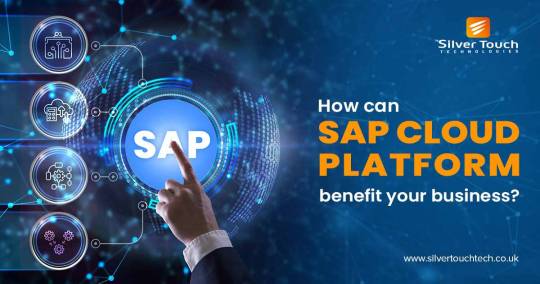
Oracle India :
Oracle, a prominent ERP provider, delivers integrated applications designed to streamline business operations. With modules spanning finance, procurement, manufacturing, sales, and customer service, Oracle ERP solutions cater to organizations of all sizes and industries. Its strength lies in handling large-scale enterprises, complex supply chains, and global operations. Oracle India boasts a robust customer base and offers comprehensive support, training, and implementation services to ensure successful ERP adoption.
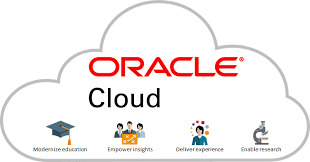
Microsoft Dynamics 365 :
Microsoft Dynamics 365 is a popular ERP provider offering a unified platform for finance, operations, sales, and customer service. With a user-friendly interface and seamless integration with other Microsoft products, Dynamics 365 simplifies processes and empowers businesses to make data-driven decisions. Its cloud-based nature allows scalability, flexibility, and easy accessibility. Microsoft provides extensive support, regular updates, and a vibrant user community, making the implementation and maintenance of Dynamics 365 a smooth experience
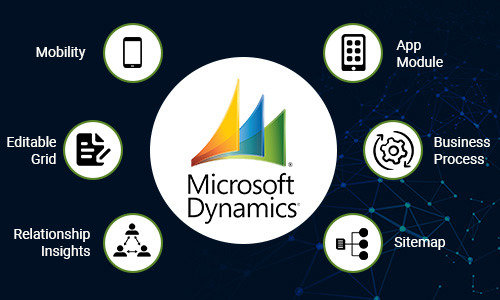
Quickensol it solutions QuickenSol IT Solutions emerges as a reliable ERP service provider, offering comprehensive solutions tailored to meet diverse business needs.QuickenSol IT Solutions empowers organizations through its robust ERP services, innovative technologies, and customer-centric approach. From seamless integration to enhanced data visibility, QuickenSol IT Solutions is dedicated to helping businesses achieve their growth objectives and stay ahead in a competitive market. quickensol offers a module covering finance, education, real estate, agriculture, laboratory, e-commerce, healthcare, insurance, logistics, construction industry, project management, and manufacturing. Quickensol offers strong customer support, an extensive knowledge base, and regular feature updates, making it a popular choice for Indian organizations seeking a reliable ERP solution.

Tally Solutions: Tally Solutions has earned the trust of small and medium-sized businesses (SMBs) in India. Their ERP software focuses on accounting and inventory management, enabling organizations to handle financial transactions, track inventory, and generate accurate reports. Tally's user-friendly interface, affordability, and localization capabilities have made it a preferred choice for Indian businesses. Tally offers comprehensive training, robust support, and regular software updates to ensure effective financial management for SMBs.
Zoho ERP :
Zoho, a prominent player in the business software market, provides a comprehensive suite of applications, including ERP solutions. Zoho ERP covers finance, inventory management, CRM, HR, and more. Known for its affordability, ease of use, and customization options, Zoho ERP caters to businesses of all sizes. The cloud-based nature of Zoho ERP allows for seamless data access, collaboration, and integration across departments. Zoho offers strong customer support, an extensive knowledge base, and regular feature updates, making it a popular choice for Indian organizations seeking a reliable ERP solution.
Ramco Systems :
Based in Chennai, Ramco Systems is an Indian ERP provider renowned for its cloud-based ERP software. Ramco offers modules for finance, HR, supply chain, manufacturing, and more, targeting various industry verticals. Their ERP solutions emphasize mobility, automation, and analytics, enabling businesses to make informed decisions and achieve operational excellence. Ramco provides comprehensive support, an easy implementation process, and regular software updates, ensuring a smooth ERP experience for organizations.
Infor India :
Infor, a global provider of industry-specific ERP solutions has a strong presence in the Indian market. Infor India offers comprehensive ERP modules tailored to specific industry verticals such as manufacturing, healthcare, hospitality, and more. Their solutions focus on process efficiency, supply chain optimization, and customer engagement. With an intuitive interface and robust functionality, Infor ERP empowers businesses to drive growth, enhance productivity, and respond swiftly to market demands.
Epicor India :
Epicor is a renowned ERP provider offering industry-specific solutions designed to meet the unique needs of organizations. Epicor India's ERP modules cater to manufacturing, distribution, retail, and services sectors. Their solutions enable businesses to streamline operations, improve customer experiences, and gain actionable insights through advanced analytics. With a strong focus on automation, scalability, and digital transformation, Epicor empowers Indian businesses to compete effectively in a rapidly evolving market.
IFS India :
IFS, a global leader in ERP software, serves businesses across various industries in India. IFS India's ERP solutions encompass modules for enterprise asset management, field service management, manufacturing, and more. The company emphasizes functionality, flexibility, and usability to ensure seamless adoption and improved operational efficiency. With their customer-centric approach and industry-specific expertise, IFS empowers organizations to optimize processes, enhance productivity, and achieve growth objectives.
Sage India :
Sage is a leading provider of ERP solutions, offering modules for finance, accounting, inventory management, and more. Sage India's ERP software caters to small and medium-sized businesses, providing them with robust tools to manage core business functions effectively. With a focus on simplicity, customization, and scalability, Sage empowers organizations to streamline operations, gain better financial visibility, and make informed decisions. Sage's commitment to customer support and continuous innovation has earned them a strong reputation in the Indian market.
Conclusion :
Selecting the right ERP provider is a crucial decision for any organization aiming to streamline operations and drive growth. The top 11 ERP providers in India, such as SAP India, Oracle India, Microsoft Dynamics 365, Quickensol IT Solution, Tally Solutions, Zoho ERP, Ramco Systems, Infor India, Epicor India, IFS India, and Sage India, offer diverse ERP solutions tailored to meet specific industry requirements. These providers empower businesses with advanced features, scalability, robust support, and seamless integration, enabling them to optimize processes, make data-driven decisions, and achieve their growth objectives. Careful evaluation of business needs, industry focus, and the unique capabilities of these ERP providers is essential to select the best fit for organizational success.
6 notes
·
View notes
Text
How to Discover the ROI of ERP Implementation Projects?
Determining the return on investment (ROI) of an enterprise resource planning (ERP) system involves a process of analyzing the expected benefits against the costs of implementing and operating the system.
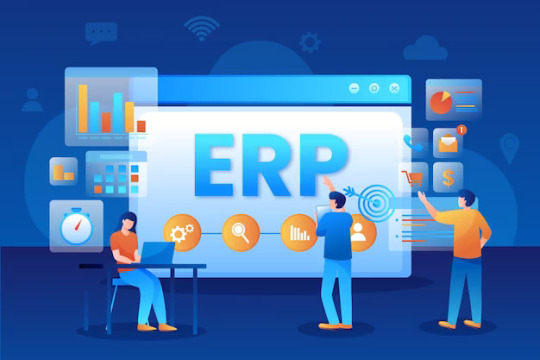
How to Calculate ROI of ERP Project?
Calculating the return on investment (ROI) for an enterprise resource planning (ERP) system involves comparing the expected benefits of the ERP implementation against its total cost.
Here are the steps to calculate ERP ROI:
Determine the total cost of the ERP implementation, including software licenses, hardware, consulting fees, employee training costs, and any other associated expenses.
Identify the expected benefits of the ERP implementation, such as increased efficiency, improved decision-making capabilities, reduced costs, increased productivity, and improved customer satisfaction.
Assign a monetary value to each expected benefit. For example, if the expected benefit is increased efficiency, calculate the potential cost savings associated with reducing manual efforts and eliminating duplicate data entry.
Estimate the time it will take to achieve each benefit and calculate the annual benefit for each benefit category.
Calculate the total expected annual benefit by adding up the annual benefits for each benefit category.
Subtract the total cost of the ERP implementation from the total expected annual benefit to get the total net benefit.
Divide the total net benefit by the total cost of the ERP implementation and multiply the result by 100 to get the ERP ROI percentage.
For example, if the total cost of the ERP implementation is $500,000 and the total expected annual benefit is $750,000, the total net benefit would be $250,000 ($750,000 - $500,000). The ERP ROI would be 50% ($250,000/$500,000 x 100). This means that for every dollar invested in the ERP system, the organization can expect to receive a return of 50 cents. It is important to note that the ROI calculation should take into account both short-term and long-term benefits and costs to get a comprehensive view of the ROI.
Determine the ROI of an ERP system
Here are the steps to determine the ROI of an ERP system:
Define the goals of the ERP system: Start by defining the goals of the ERP system, such as reducing operating costs, improving productivity, or enhancing customer service.
Identify the costs of the ERP system: Determine the total cost of the ERP system, including software licensing, hardware, consulting fees, employee training, and any other associated expenses.
Quantify the benefits of the ERP system: Identify the potential benefits of the ERP system, such as reduced operating costs, improved productivity, and increased revenue. Assign a monetary value to each benefit based on the potential financial impact on the organization.
Estimate the time to achieve benefits: Determine the time it will take to achieve each benefit and calculate the annual benefit for each benefit category.
Calculate the total expected annual benefit: Add up the annual benefits for each benefit category to get the total expected annual benefit.
Calculate the net present value (NPV) of the ERP system: Calculate the present value of the expected benefits minus the present value of the expected costs, using a discounted cash flow (DCF) analysis.
Calculate the ROI: Divide the NPV by the total cost of the ERP system and multiply by 100 to get the ROI percentage.
Conclusion:
ERP implementation can help you in many ways but without the calculation of Return on investment then you spend is totally lost. So make sure you have a good volume of return before investing in the ERP implementation. If you are planning to ERP implementation definitely you will conclude with the best oracle ERP cloud implementation, choose the service who has a year of expertise in oracle ERP implementation and the relevant field.
#erp implementation#erpcloud#erp software#erp implementation service#best erp implementation service#oraclecloudinfrastructure#oraclecloud#oracle implementation#erp modules#ERP software implementation
2 notes
·
View notes
Text
High-Paying Career Opportunities for Oracle Fusion Financials Professionals.

Oracle Fusion Financials is a leading cloud-based financial management solution that integrates comprehensive financial applications with cutting-edge technology. As businesses increasingly migrate to cloud-based ERP solutions, professionals skilled in Oracle Fusion Financials are in high demand. This demand translates into lucrative career opportunities across industries. Let’s explore some of the top high-paying career paths for Oracle Fusion Financials professionals.
1. Oracle Fusion Financials Consultant
Average Salary: $90,000 – $150,000 per year
Oracle Fusion Financials Consultants help organizations implement and optimize Oracle Fusion Financials modules. They analyze business requirements, configure the system, and provide training to end-users. This role requires deep knowledge of financial processes and Oracle Cloud applications.
Key Responsibilities:
Implementing Oracle Fusion Financials solutions
Customizing financial modules to align with business needs
Training and supporting end-users
Troubleshooting system issues and optimizing performance
2. Oracle Fusion Financials Functional Lead
Average Salary: $100,000 – $160,000 per year
A Functional Lead is responsible for leading the implementation of Oracle Fusion Financials solutions for enterprises. They work closely with stakeholders to ensure smooth adoption and integration.
Key Responsibilities:
Leading Oracle Fusion Financials implementation projects
Coordinating between business and technical teams
Ensuring compliance with financial regulations
Managing project timelines and deliverables
3. Oracle Fusion Financials Technical Consultant
Average Salary: $95,000 – $145,000 per year
Technical Consultants focus on the technical aspects of Oracle Fusion Financials, including integrations, customizations, and troubleshooting. They need strong programming skills and an understanding of Oracle tools like SQL, PLSQL, and BI Publisher.
Key Responsibilities:
Developing custom reports and dashboards
Integrating Oracle Fusion Financials with other enterprise systems
Resolving technical issues and optimizing system performance
Automating financial processes through scripting and configuration
4. Oracle Cloud ERP Finance Solution Architect
Average Salary: $120,000 – $180,000 per year
Solution Architects design and oversee the deployment of Oracle Fusion Financials solutions, ensuring they align with an organization's strategic goals. This senior role requires deep expertise in ERP systems and financial processes.
Key Responsibilities:
Designing end-to-end Oracle Fusion Financials solutions
Providing strategic guidance on financial transformations
Ensuring system scalability and security
Collaborating with executives and IT teams
5. Oracle Fusion Financials Business Analyst
Average Salary: $85,000 – $140,000 per year
Business Analysts bridge the gap between business needs and Oracle Fusion Financials capabilities. They analyze financial processes, gather requirements, and help optimize system usage.
Key Responsibilities:
Conducting business process analysis and recommending improvements
Gathering and documenting system requirements
Coordinating with technical teams for system enhancements
Supporting financial reporting and data analysis
6. Oracle Fusion Financials Project Manager
Average Salary: $110,000 – $170,000 per year
Project Managers oversee the implementation and integration of Oracle Fusion Financials in an organization. They ensure projects are delivered on time, within budget, and meet business objectives.
Key Responsibilities:
Managing end-to-end Oracle Fusion Financials projects
Coordinating with functional and technical teams
Monitoring project risks and implementing mitigation strategies
Ensuring stakeholder alignment and satisfaction
7. Oracle Fusion Financials Trainer
Average Salary: $80,000 – $130,000 per year
With the rising demand for Oracle Fusion Financials professionals, training and coaching have become a lucrative career path. Trainers help individuals and organizations upskill in Oracle Cloud Financials.
Key Responsibilities:
Conducting training sessions on Oracle Fusion Financials modules
Developing course materials and hands-on exercises
Assisting learners with real-world financial scenarios
Keeping up-to-date with the latest Oracle Cloud updates
Conclusion
Oracle Fusion Financials professionals have numerous high-paying career opportunities across various industries. With businesses increasingly adopting Oracle Cloud solutions, expertise in this domain can lead to rewarding job roles with excellent salary potential. Investing in training and certification in Oracle Fusion Financials can significantly enhance career prospects and open doors to leadership positions in the financial and ERP sectors.Are you looking to kickstart your career in Oracle Fusion Financials? Enroll in a structured training program to gain in-depth knowledge and hands-on experience, ensuring you are well-prepared for these lucrative roles. To Your bright future join Oracle Fusion Financials.
#erptree#jobguarantee#oraclefusion#oraclefusionfinancials#100jobguarantee#hyderabadtraining#financecareers#erptraining#financejobs#careergrowth
0 notes
Text
What Oracle Skills Are Currently In High Demand?

Introduction
Oracle technologies dominate the enterprise software landscape, with businesses worldwide relying on Oracle databases, cloud solutions, and applications to manage their data and operations. As a result, professionals with Oracle expertise are in high demand. Whether you are an aspiring Oracle professional or looking to upgrade your skills, understanding the most sought-after Oracle competencies can enhance your career prospects. Here are the top Oracle skills currently in high demand.
Oracle Database Administration (DBA)
Oracle Database Administrators (DBAs) are crucial in managing and maintaining Oracle databases. Unlock the world of database management with our Oracle Training in Chennai at Infycle Technologies. Organizations seek professionals to ensure optimal database performance, security, and availability. Key skills in demand include:
Database installation, configuration, and upgrades
Performance tuning and optimization
Backup and recovery strategies using RMAN
High-availability solutions such as Oracle RAC (Real Application Clusters)
Security management, including user access control and encryption
SQL and PL/SQL programming for database development
Oracle Cloud Infrastructure (OCI)
With businesses rapidly moving to the cloud, Oracle Cloud Infrastructure (OCI) has become a preferred choice for many enterprises. Professionals skilled in OCI can help organizations deploy, manage, and optimize cloud environments. Key areas of expertise include:
Oracle Cloud Architecture and Networking
OCI Compute, Storage, and Database services
Identity and Access Management (IAM)
Oracle Kubernetes Engine (OKE)
Security Best Practices and Compliance in Cloud Environments
Migration strategies from on-premises databases to OCI
Oracle SQL And PL/SQL Development
Oracle SQL and PL/SQL are fundamental database developers, analysts, and administrators skills. Companies need professionals who can:
Write efficient SQL queries for data retrieval & manipulation
Develop PL/SQL procedures, triggers, and packages
Optimize database performance with indexing and query tuning
Work with advanced SQL analytics functions and data modelling
Implement automation using PL/SQL scripts
Oracle ERP And E-Business Suite (EBS)
Enterprise Resource Planning (ERP) solutions from Oracle, such as Oracle E-Business Suite (EBS) and Oracle Fusion Cloud ERP, are widely used by organizations to manage business operations. Professionals with rising experience in these areas are highly sought after. Essential skills include:
ERP implementation and customization
Oracle Financials, HRMS, and Supply Chain modules
Oracle Workflow and Business Process Management
Reporting and analytics using Oracle BI Publisher
Integration with third-party applications
Oracle Fusion Middleware
Oracle Fusion Middleware is a comprehensive software suite that facilitates application integration, business process automation, and security. Professionals with experience in:
Oracle WebLogic Server administration
Oracle SOA Suite (Service-Oriented Architecture)
Oracle Identity and Access Management (IAM)
Oracle Data Integration and ETL tools
The job market highly values Java EE and Oracle Application Development Framework (ADF).
Oracle BI (Business Intelligence) And Analytics
Data-driven decision-making is critical for modern businesses, and Oracle Business Intelligence (BI) solutions help organizations derive insights from their data. In-demand skills include:
Oracle BI Enterprise Edition (OBIEE)
Oracle Analytics Cloud (OAC)
Data warehousing concepts and ETL processes
Oracle Data Visualization and Dashboarding
Advanced analytics using machine learning and AI tools within Oracle BI
Oracle Exadata And Performance Tuning
Oracle Exadata is a high-performance engineered system designed for large-scale database workloads. Professionals skilled in Oracle Exadata and performance tuning are in great demand. Essential competencies include:
Exadata architecture and configuration
Smart Flash Cache and Hybrid Columnar Compression (HCC)
Exadata performance tuning techniques
Storage indexing and SQL query optimization
Integration with Oracle Cloud for hybrid cloud environments
Oracle Security And Compliance
Organizations need Oracle professionals to ensure database and application security with increasing cybersecurity threats. Key security-related Oracle skills include:
Oracle Data Safe and Database Security Best Practices
Oracle Audit Vault and Database Firewall
Role-based access control (RBAC) implementation
Encryption and Data Masking techniques
Compliance with regulations like GDPR and HIPAA
Oracle DevOps And Automation
DevOps practices have become essential for modern software development and IT operations. Enhance your journey toward a successful career in software development with Infycle Technologies, the Best Software Training Institute in Chennai. Oracle professionals with DevOps expertise are highly valued for their ability to automate processes and ensure continuous integration and deployment (CI/CD). Relevant skills include:
Oracle Cloud DevOps tools and automation frameworks
Terraform for Oracle Cloud Infrastructure provisioning
CI/CD pipeline implementation using Jenkins and GitHub Actions
Infrastructure as Code (IaC) practices with Oracle Cloud
Monitoring and logging using Oracle Cloud Observability tools
Oracle AI And Machine Learning Integration
Artificial intelligence (AI) and machine learning (ML) are transforming businesses' operations, and Oracle has integrated AI/ML capabilities into its products. Professionals with expertise in:
Oracle Machine Learning (OML) for databases
AI-driven analytics in Oracle Analytics Cloud
Chatbots and AI-powered automation using Oracle Digital Assistant
Data Science and Big Data processing with Oracle Cloud are highly demanding for data-driven decision-making roles.
Conclusion
The demand for Oracle professionals grows as businesses leverage Oracle's powerful database, cloud, and enterprise solutions. Whether you are a database administrator, cloud engineer, developer, or security expert, acquiring the right Oracle skills can enhance your career opportunities and keep you ahead in the competitive job market. You can position yourself as a valuable asset in the IT industry by focusing on high-demand skills such as Oracle Cloud Infrastructure, database administration, ERP solutions, and AI/ML integration. If you want to become an expert in Oracle technologies, consider enrolling in Oracle certification programs, attending workshops, and gaining hands-on experience to strengthen your skill set and stay ahead in the industry.
0 notes
Photo

Oracle Fusion Financials Online Training
Tech Leads IT is the best institute offering Oracle Fusion Financials Training with detailed content covering almost all the modules and business cycles in the training. The instructor is very knowledgeable and kind enough to cover this much curriculum with a detailed explanation based on Real-Time Project Examples.
Contact US
Address: 44/A, #302, Floor no: 3, Geetanjali Apartments, Opp Bahar Cafe, Near SR Nagar Police Station SR Nagar, Hyderabad.
Call Us: +91-8125323232
Email Us: [email protected]
https://www.techleadsit.com/oracle-fusion-financials-online-training-course
#Oracle Fusion Financials Training#Oracle Fusion Financials Online Training#Fusion Financials Online Training#Oracle Cloud Financials Online Training#Oracle Cloud Financials Training Online
0 notes
Text
Oracle Fusion Financials Cloud Online Certification and Training | CloudShine
CloudShine provides the best oracle fusion financials online certification and training courses at affordable prices. Our oracle cloud financials training will make you industry ready within 60 hours. Request a free demo!

0 notes
Text
Unlock Your Potential with Oracle Fusion Financials Online Training

In today's fast-paced business environment, professionals must stay ahead of the curve by acquiring relevant skills to remain competitive. Oracle Fusion Financials course is a robust cloud-based solution that helps businesses optimize and automate their financial management processes. As companies increasingly shift to cloud technologies, the demand for skilled professionals proficient in tools like Oracle Fusion Financials continues to rise. Enrolling in Oracle Fusion Financials Online Training opens opportunities for professionals to enhance their expertise and become invaluable assets in financial management roles.
What are Oracle Fusion Financials?
Oracle Fusion Financials is a comprehensive part of Oracle's Cloud suite, designed to streamline and automate financial management processes. It combines traditional financial management features with modern technology, providing organizations an integrated platform to manage their financial operations efficiently. Some of the key modules in Oracle Fusion Financials include General Ledger (GL), Accounts Payable (AP), Accounts Receivable (AR), Cash Management, Financial Reporting, and more. These modules enable businesses to handle day-to-day financial transactions, generate accurate financial reports, and ensure compliance with industry standards.
Oracle Fusion Financials is seamlessly integrated with other Oracle Cloud applications, allowing companies to unify their enterprise resource planning (ERP) processes. As a result, professionals with expertise in Oracle Fusion Financials can assist organizations in both short-term financial transactions and long-term financial planning, making them highly sought after by businesses across industries.
Why Oracle Fusion Financials is Crucial for Your Career
There are several reasons why mastering Oracle Fusion Financials is an excellent investment in your career development:
1. High Demand for Cloud Financial Expertise
The increasing trend of businesses migrating to cloud technologies has led to a growing demand for professionals who can manage and optimize cloud-based financial systems. As traditional on-premise financial systems are being replaced, organizations seek professionals with expertise in cloud platforms like Oracle Fusion Financials. By gaining proficiency in this cutting-edge financial tool, you make yourself more attractive to employers and position yourself to seize high-demand opportunities in financial management.
2. Comprehensive Understanding of Financial Processes
Oracle Fusion Financials covers a wide range of financial management functions. These include managing general ledgers, automating accounts payable and receivable, generating financial reports, and assisting in strategic decision-making. Enrolling in online training gives you a holistic understanding of these economic processes. This comprehensive knowledge makes you capable of handling complex financial tasks across various business functions and ensures you are ready to take on responsibilities in different financial management roles.
3. Improved Job Prospects
With Oracle Fusion Financials on your resume, you'll be well-positioned for roles like Financial Analyst, Finance Manager, Financial Controller, and Oracle Financials Consultant. These positions are in high demand, and businesses seek skilled professionals who can navigate cloud-based financial tools. Acquiring Oracle certifications further boosts your profile, indicating to employers that you possess the necessary skills to impact their financial operations immediately.
4. Hands-On Experience and Real-World Application
Oracle Fusion Financials Online Training places a strong emphasis on practical experience. The training includes hands-on labs and exercises that simulate real-world financial scenarios, helping you apply your knowledge in a controlled environment. This real-world application ensures you are job-ready and confident in your ability to handle the challenges that may arise in actual financial management roles.
5. Flexibility and Convenience
One of the main advantages of online training is its flexibility. You can learn at your own pace, which is perfect for professionals with busy schedules. Whether you're balancing work, personal commitments, or other responsibilities, Oracle Fusion Financials Online Training allows you to access learning materials and recorded sessions at any time, from anywhere. This convenience makes it easier for you to upgrade your skills without interrupting your daily life.
Key Benefits of Oracle Fusion Financials Online Training
Oracle Fusion Financials Online Training provides a comprehensive education, ensuring participants have the skills needed for career advancement. Here are some of the key benefits:
1. Expert-Led Instruction
Experienced instructors lead the training with in-depth knowledge of both financial management and Oracle applications. These experts provide valuable insights and real-world examples to ensure you understand complex concepts. Additionally, instructors are available for personalized support to clarify doubts or provide further explanations throughout the course.
2. Structured Learning Path
The course follows a well-structured learning path that begins with the fundamentals of financial management and progresses to advanced topics. You'll start with the basics and gradually move through the various modules in Oracle Fusion Financials, ensuring a solid understanding of the software before tackling more challenging material. This structured approach enhances your ability to retain and apply the information learned.
3. Hands-On Experience
The training includes practical exercises, labs, and simulations replicating financial tasks. This hands-on approach allows you to apply what you've learned and gain confidence in using Oracle Fusion Financials in practical scenarios. Hands-on experience is essential for mastering the platform and building the skills necessary to succeed in the workplace.
4. Comprehensive Coverage of Core Modules
The course covers all of the core modules essential for managing financial operations, including:
General Ledger (GL): Learn how to manage and configure your organization's chart of accounts, process journal entries, and ensure accurate reporting.
Accounts Payable (AP): Understand how to handle vendor invoices, process payments, and maintain strong supplier relationships.
Accounts Receivable (AR): Gain expertise in managing customer invoicing, processing payments, and overseeing collections.
Cash Management: Master cash flow management, bank reconciliations, and liquidity monitoring.
Financial Reporting: Learn how to create detailed financial reports and perform analytics for strategic business decisions.
By completing the course, you will gain proficiency in these key areas, which are critical for anyone in financial management.
5. Access to Learning Resources and Support
Online training typically offers many learning resources, including study guides, video tutorials, and detailed documentation, which supplement the course content. Furthermore, you'll have access to a support team ready to assist you with any questions or challenges, ensuring you stay on track and succeed throughout the course.
Key Modules Covered in Oracle Fusion Financials Online Training
The Oracle Fusion Financials Online Training course covers several key areas that you'll need to understand for effective financial management:
General Ledger (GL) Setup and Management
Accounts Payable (AP) and Vendor Management
Accounts Receivable (AR) and Customer Management
Cash Management and Reconciliation
Financial Reporting and Analytics
Tax Management and Compliance
Intercompany Transactions
Fixed Asset Management
These modules provide a solid foundation for anyone looking to manage and optimize financial operations within an organization.
Career Opportunities with Oracle Fusion Financials Expertise
Completing Oracle Fusion Financials Online Training opens the door to a wide range of career opportunities. Some of the roles that you can pursue after completing the course include:
Financial Analyst
Finance Manager
Financial Controller
Oracle Financials Consultant
Accounts Manager
ERP Financial Specialist
Oracle Fusion Financials professionals are in high demand across industries, including finance, healthcare, retail, and manufacturing, making this training a wise investment in your future.
Conclusion:
Oracle Fusion Financials Online Training is an invaluable opportunity to advance your career in finance. With the increasing adoption of cloud technologies, organizations seek skilled professionals to manage their financial operations using modern tools like Oracle Fusion Financials. This training will give you the knowledge, skills, and hands-on experience needed to succeed in various finance-related roles. Whether you're looking to enter the field or advance in your current career, Oracle Fusion Financials training will help you unlock your full potential and impact your professional future.
#oracle fusion financials training in hyderabad#oracle fusion financials online training#oracle fusion financials training material
1 note
·
View note
Text
Project Portfolio Management Market 2025 Update: Latest Developments and Innovations
The recently released Fortune Business Insights research on the Global Project Portfolio Management Market survey report provides facts and statistics regarding market structure and size. Global Project Portfolio Management Market Size 2025 Research report presents an in-depth analysis of the Global Market size, growth, share, segments, manufacturers, and forecast, competition landscape and growth opportunity. The research’s goal is to provide market data and strategic insights to help decision-makers make educated investment decisions while also identifying potential gaps and development possibilities.
Get Sample PDF Brochure: https://www.fortunebusinessinsights.com/enquiry/request-sample-pdf/104257
Companies Profiled in the Global Project Portfolio Management Market:
Oracle Corporation (U.S.)
Microsoft Corporation (U.S.)
SAP SE (Germany)
Adobe (Workfront) (U.S.)
Hewlett Packard Enterprise Development LP (U.S.)
Broadcom Inc. (U.S.)
ServiceNow (U.S.)
HEXAGON AB (Sweden)
ATLASSIAN (U.S.)
Planview, Inc. (U.S.)
Adoption of Agile Business Models to Spur Growth
Traditional waterfall management is not always effective. Thus, companies adopt agile business models for effective management of activity, cost, equipment, and resource. Agile business practices assist in maintaining the capabilities of a company during changing business environments. These factors will increase the project portfolio management market share. As per a survey by significant players, around 37% of the time can be saved when working on a project using agile principles.
On the contrary, data breaching concerns and budget constraints may stifle the project portfolio management market growth.
What exactly is included in the Report?
– Industry Trends and Developments: In this section, the authors of the research discuss the significant trends and developments that are occurring in the Project Portfolio Management Market place, as well as their expected impact on the overall growth.
– Analysis of the industry’s size and forecast: The industry analysts have provided information on the size of the industry from both a value and volume standpoint, including historical, present and projected figures.
– Future Prospects: In this portion of the study market participants are presented with information about the prospects that the Project Portfolio Management Market is likely to supply them with.
– The Competitive Landscape: This section of the study sheds light on the competitive landscape of the Project Portfolio Management Market by examining the important strategies implemented by vendors to strengthen their position in the global market.
– Study on Industry Segmentation: This section of the study contains a detailed overview of the important Project Portfolio Management Market segments, which include product type, application, and vertical, among others.
– In-Depth Regional Analysis: Vendors are provided with in-depth information about high-growth regions and their particular countries, allowing them to place their money in more profitable areas.
This Report Answers the Following Questions:
What are the Project Portfolio Management Market growth drivers, hindrances, and dynamics?
Which companies would lead the market by generating the largest revenue?
How will the companies surge the processes adoption amid the COVID-19 pandemic?
Which region and segment would dominate the Project Portfolio Management Market in the coming years?
Project Portfolio Management Market Segments:
By Component
Software
Services
Integration and Deployment
Training and Consulting
Support and Maintenance
By Deployment
On-premise
Cloud-based
Hosted
By Enterprise Type
Large Enterprises
Small and Medium Enterprises (SMEs)
By Application
Project and Portfolio Governance
Portfolio Dashboards and Analytics
Visibility and Reporting
Resource Management
Financial Planning and Management
Others (Time and Risk Management)
By Vertical
IT and Telecommunications
BFSI
Government
Engineering & Construction
Healthcare
Others (Manufacturing)
Table Of Content:
1. Introduction 1.1. Research Scope 1.2. Market Segmentation 1.3. Research Methodology 1.4. Definitions and Assumptions
2. Executive Summary
3. Market Dynamics 3.1. Market Drivers 3.2. Market Restraints 3.3. Market Opportunities
4. Key Insights 4.1 Global Statistics — Key Countries 4.2 New Product Launches 4.3 Pipeline Analysis 4.4 Regulatory Scenario — Key Countries 4.5 Recent Industry Developments — Partnerships, Mergers & Acquisitions
5. Global Project Portfolio Management Market Analysis, Insights and Forecast 5.1. Key Findings/ Summary 5.2. Market Analysis — By Product Type 5.3. Market Analysis — By Distribution Channel 5.4. Market Analysis — By Countries/Sub-regions
……………
11. Competitive Analysis 11.1. Key Industry Developments 11.2. Global Market Share Analysis 11.3. Competition Dashboard 11.4. Comparative Analysis — Major Players
12. Company Profiles
12.1 Overview 12.2 Products & Services 12.3 SWOT Analysis 12.4 Recent developments 12.5 Major Investments 12.6 Regional Market Size and Demand
13. Strategic Recommendations
TOC Continued……………….
About Us:
Fortune Business Insights™ Delivers Accurate Data And Innovative Corporate Analysis, Helping Organizations Of All Sizes Make Appropriate Decisions. We Tailor Novel Solutions For Our Clients, Assisting Them To Address Various Challenges Distinct To Their Businesses. Our Aim Is To Empower Them With Holistic Market Intelligence, Providing A Granular Overview Of The Market They Are Operating In.
Contact Us:
Fortune Business Insights™ Pvt. Ltd.
US:+1 424 253 0390
UK:+44 2071 939123
APAC:+91 744 740 1245
Email:[email protected]
0 notes
